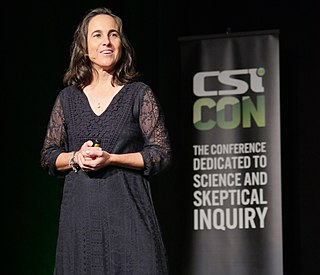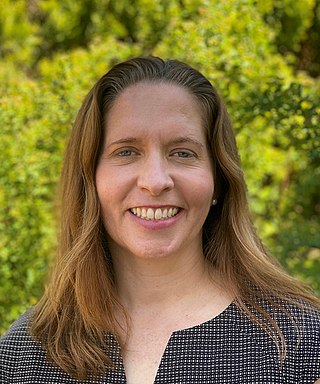
Bjørn Lomborg is a Danish political scientist, author, and the president of the think tank Copenhagen Consensus Center. He is the former director of the Danish government's Environmental Assessment Institute (EAI) in Copenhagen. He became internationally known for his best-selling book The Skeptical Environmentalist (2001).

The Committee for Skeptical Inquiry (CSI), formerly known as the Committee for the Scientific Investigation of Claims of the Paranormal (CSICOP), is a program within the U.S. non-profit organization Center for Inquiry (CFI), which seeks to "promote scientific inquiry, critical investigation, and the use of reason in examining controversial and extraordinary claims." Paul Kurtz proposed the establishment of CSICOP in 1976 as an independent non-profit organization, to counter what he regarded as an uncritical acceptance of, and support for, paranormal claims by both the media and society in general. Its philosophical position is one of scientific skepticism. CSI's fellows have included notable scientists, Nobel laureates, philosophers, psychologists, educators, and authors. It is headquartered in Amherst, New York.

William Ernest McKibben is an American environmentalist, author, and journalist who has written extensively on the impact of global warming. He is the Schumann Distinguished Scholar at Middlebury College and leader of the climate campaign group 350.org. He has authored a dozen books about the environment, including his first, The End of Nature (1989), about climate change, and Falter: Has the Human Game Begun to Play Itself Out? (2019), about the state of the environmental challenges facing humanity and future prospects.
A debunker is a person or organization that exposes or discredits claims believed to be false, exaggerated, or pretentious. The term is often associated with skeptical investigation of controversial topics such as UFOs, claimed paranormal phenomena, cryptids, conspiracy theories, alternative medicine, religion, exploratory or fringe areas of scientific, or pseudoscientific research.
Public awareness of science (PAwS) is everything relating to the awareness, attitudes, behaviors, opinions, and activities that comprise the relations between the general public or lay society as a whole to scientific knowledge and organization. This concept is also known as public understanding of science (PUS), or more recently, public engagement with science and technology (PEST). It is a comparatively new approach to the task of exploring the multitude of relations and linkages science, technology, and innovation have among the general public. While early work in the discipline focused on increasing or augmenting the public's knowledge of scientific topics, in line with the information deficit model of science communication, the deficit model has largely been abandoned by science communication researchers. Instead, there is an increasing emphasis on understanding how the public chooses to use scientific knowledge and on the development of interfaces to mediate between expert and lay understandings of an issue. Newer frameworks of communicating science include the dialogue and the participation models. The dialogue model aims to create spaces for conversations between scientists and non-scientists to occur while the participation model aims to include non-scientists in the process of science.

Kendrick Crosby Frazier was an American science writer and longtime editor of Skeptical Inquirer magazine. He was also a former editor of Science News, author or editor of ten books, and a Fellow of the American Association for the Advancement of Science (AAAS). He was a fellow and a member of the executive council of Committee for Skeptical Inquiry (CSI), an international organization which promotes scientific inquiry.

Christopher Cole Mooney is an American journalist and author of four books including The Republican War on Science (2005). Mooney's writing focuses on subjects such as climate change denialism and creationism in public schools, and he has been described as "one of the few journalists in the country who specialize in the now dangerous intersection of science and politics." In 2020 he was awarded a Pulitzer Prize for a series of articles on global warming published in The Washington Post.

Naomi Oreskes is an American historian of science. She became Professor of the History of Science and Affiliated Professor of Earth and Planetary Sciences at Harvard University in 2013, after 15 years as Professor of History and Science Studies at the University of California, San Diego.

Benjamin Radford is an American writer, investigator, and skeptic. He has authored, coauthored or contributed to over twenty books and written over a thousand articles and columns on a wide variety of topics including urban legends, unexplained mysteries, the paranormal, critical thinking, mass hysteria, and media literacy. His book, Mysterious New Mexico: Miracles, Magic, and Monsters in the Land of Enchantment, was published in the summer of 2014 and is a scientific investigation of famous legends and folklore in the state of New Mexico. In 2016 Radford published Bad Clowns, a 2017 IPPY bronze award winner, and he is regarded as an expert on the bad clowns phenomenon.

Science communication encompasses a wide range of activities that connect science and society. Common goals of science communication include informing non-experts about scientific findings, raising the public awareness of and interest in science, influencing people's attitudes and behaviors, informing public policy, and engaging with diverse communities to address societal problems. The term "science communication" generally refers to settings in which audiences are not experts on the scientific topic being discussed (outreach), though some authors categorize expert-to-expert communication as a type of science communication. Examples of outreach include science journalism and health communication. Since science has political, moral, and legal implications, science communication can help bridge gaps between different stakeholders in public policy, industry, and civil society.

Karen Stollznow is an Australian-American author, linguist, public speaker, and podcaster. Her books include Missed Conceptions: How We Make Sense of Infertility, On the Offensive: Prejudice in Language Past and Present, The Language of Discrimination, God Bless America: Strange and Unusual Religious Beliefs and Practices in the United States, Haunting America, Language Myths, Mysteries and Magic, Hits and Mrs, and Would You Believe It?: Mysterious Tales From People You'd Least Expect. Stollznow also writes short fiction, including the title Fisher's Ghost and Other Stories, and she is a host on the podcast Monster Talk with Blake Smith. She has written for many popular publications, including The Conversation and Psychology Today. Stollznow has also appeared as an expert on many TV shows, including A Current Affair and the History Channel's History's Greatest Mysteries.
Skeptical Science is a climate science blog and information resource created in 2007 by Australian former cartoonist and web developer, John Cook, who received a PhD degree in cognitive science in 2016. In addition to publishing articles on current events relating to climate science and climate policy, the site maintains a database of articles analyzing the merit of arguments put forth by those who oppose the mainstream scientific opinion on climate change.

Donald Ross Prothero is an American geologist, paleontologist, and author who specializes in mammalian paleontology and magnetostratigraphy, a technique to date rock layers of the Cenozoic era and its use to date the climate changes which occurred 30–40 million years ago. He is the author or editor of more than 30 books and over 300 scientific papers, including at least 5 geology textbooks.

Scott O. Lilienfeld was a professor of psychology at Emory University and advocate for evidence-based treatments and methods within the field. He is known for his books 50 Great Myths of Popular Psychology, Brainwashed, and others that explore and sometimes debunk psychological claims that appear in the popular press. Along with having his work featured in major U.S. newspapers and journals such as The New York Times, The New Yorker, and Scientific American, Lilienfeld made television appearances on 20/20, CNN and the CBS Evening News.

Stuart Vyse is an American psychologist, teacher, speaker and author who specializes in belief in superstitions and critical thinking. He is frequently invited as a speaker and interviewed by the media as an expert on superstitious behavior. His book Believing in Magic: The Psychology of Superstition won the American Psychological Association's William James Book Award.

Climate communication or climate change communication is a field of environmental communication and science communication focused on discussing the causes, nature and effects of anthropogenic climate change.

William M. London is an American professor of public health and a consumer advocate. He is the editor of the Quackwatch network's weekly electronic newsletter Consumer Health Digest and has written for both professional and general audiences. Health fraud figures prominently among his writing and research interests.

Bertha Vazquez is director of education for the Center for Inquiry, director of the Teacher Institute for Evolutionary Science (TIES), a program of the Center for Inquiry and a project of the Richard Dawkins Foundation for Reason and Science, and a retired middle school science teacher at the George Washington Carver Middle School in the Miami-Dade County Public Schools. She also manages the educational aspects of Science Saves and Young Skeptics, two other CFI programs.

Jennie C. Stephens is an academic researcher, professor, author, and social justice advocate. She is Professor of Sustainability Science & Policy at Northeastern University in Boston, Massachusetts. She is also affiliated with the Women's, Gender and Sexuality Studies Program, the department of Civil & Environmental Engineering and the department of Cultures, Societies & Global Studies.












